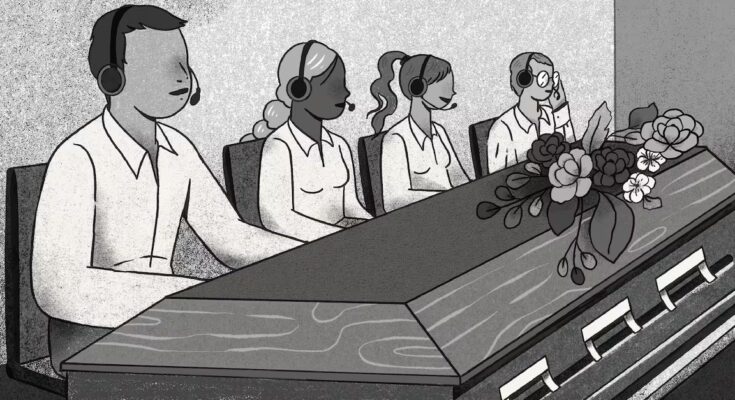María Suárez, 43, has worked in the sales sector for more than 15 years. It was supposed to market perfumes, makeup or women’s clothes, among other products. He went door to door offering different items. She admits she wasn’t the best at her job, but at least it was enough to support herself. But when it was his turn to “sell death”, the doors always closed in his face. He says that a woman of about 40 even scolded him and shouted “I don’t want to die!”, throwing what looked like a bottle of holy water at him. Years later he realized that his approach had not been ideal. In offering funeral services, according to several marketing experts, it is not a question of offering a product, but rather a “homage” and solutions to the unexpected.
Cristian Infante, 45, has been working at Jardín de los Pinos, in Monterrey, for almost two years. He admits, on the phone, that it’s not an easy industry and is precise: “98% of people will reject you. There are still a lot of taboos. People telling you ‘I don’t want to die’ or ‘Stay away, death is calling’. There’s a lot of rejection you face, so you have to find a way to overcome it.”
According to data from the Ministry of Economy, the workforce of funeral service workers in the first quarter of 2025 was more than 15,000 people, whose salary averaged just over 7,000 Mexican pesos (nearly $400) working about 47.4 hours per week. The average age of employees in this sector was 44.5 years. The workforce was distributed between 42.7% men with an average salary of 9,400 pesos and 57.3% women with an average salary of 6,360.
It is for this reason that Infante highlights two previous steps that are important for selling any type of product, especially these types of services. The first: overcome the shame of offering your product. The second, knowing how to overcome rejection. His sales experience and expertise have taught him how to use that minute or two to get a person to listen to him. “I believe you can achieve a lot by planting that little seed or that little worm in them with the knowledge that this (the service they offer) is absolutely necessary. This is more than anything, convincing the customer with advice, instead of jumping in with the product. Because our product scares you,” he explains.
Infante maintains that in this business the key, when you know how to do it well, is to offer solutions. One of the approaches this salesperson takes with potential customers is to “problem solve.” Offer the person interested in hiring a funeral service the peace of mind that their family will face minimal problems in a time of grief. May they have the opportunity to say goodbye, “both with sadness and with affection”, without economic conflicts, in peace and according to each person’s conditions. “Nobody wants to die. The joke is that we’re all going to die, but you can’t say that. So you go like this. You tell the client ‘I don’t want you to die either. On the contrary, I want you to live a more peaceful life, knowing that the inevitable is already covered,’ he says.
Like any industry, Infante explains that they have high and low seasons. For funeral services, according to what is said, it falls every year between the second half of October and the first half of November, coinciding with a very Mexican tradition such as the Day of the Dead.
“These dates are when people are most reminded that this is inevitable and that they need to prepare. Tradition makes it more obvious. People visit their dead. Or if they don’t visit them, they are shown on television. Coconut (a famous film about this holiday) and everything about this date in the shops, makes you think: “Oh, I have nothing prepared for my family!”, says the seller.
Although he also admits that they have low periods. Statistically, he explains, when there are fewer sales it is during the back to school period, between the end of August and the beginning of September. According to data from the company where Infante works, adults between 35 and 60 are the segment that mostly buys or thinks about acquiring this type of service. However, another factor that gets in the way of the numbers is trauma. Some experience between life and death, whether yours or that of a family member or acquaintance. Infante says one of his youngest clients is in his 20s from an experience like that. Another of them, following the previous logic, is a delivery person for the Didi application. “He said to me, ‘Yes, I’m interested in buying a little piece of land. Last time I flew about 15 meters and I just remember waking up in the hospital with a broken arm and shoulder. I’m in this thing and it’s what I live for. Yes, I’m interested in being prepared so as not to leave the burden on my father,'” Infante says.
The sales agent of the Jardín de los Pinos says that this work also has its peculiarities. He says one customer, with whom he was unable to close the sale, asked to be monitored at his home, which is not unusual, he explains. However, his request was that while he was being watched, his relatives could carry him in his coffin and take him for a walk around the block so that his neighbors could say goodbye to him. “We had to make some recommendations on the weather conditions, when it is not done in one of our chapels, on the risks of how the decomposition of the remains can be accelerated when the air-conditioned spaces that we offer in our spaces are not taken into account. The sale has not been realized, but it is the strangest request I have had so far,” he concludes.



